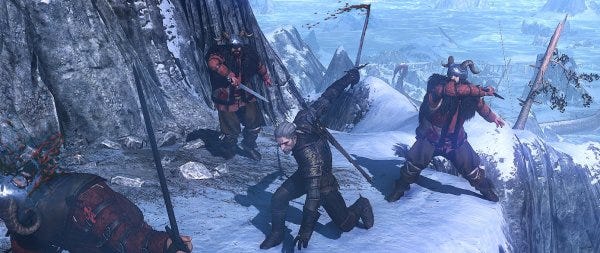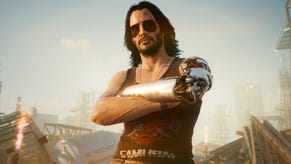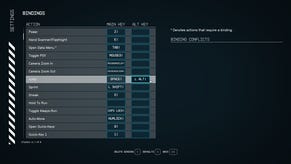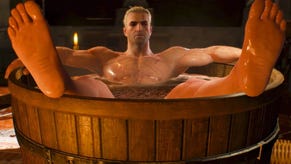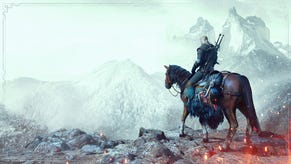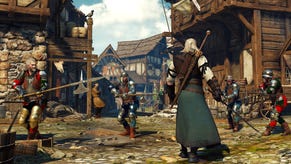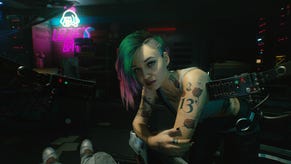CDP On Role Of Combat, Sex, And Choice In Witcher 3
A Feast Or A Massacre
Geralt has a beard now. We know this much for certain. Oh, and I suppose he's also got that whole open-world thing going on. But adding a new number to your title's a big responsibility, and a simple promise that you'll feed it, water it, and add boats for some reason (because year of the bow is over; hopefully year of the boat will be a worthy successor) doesn't always cut it. So what else is going into The Witcher trilogy's 50-100-hour swan song? To hear CD Projekt tell it, pretty much everything they could think of. The Witcher 3's scope is beyond ambitious, but that doesn't mean the Polish powerhouse is skimping on details. Read on to see senior quest designer Jakub Rokosz and marketing mastermind Michał Platkow-Gilewski discuss revamped combat, managing difficulty/learning curve, how big of an impact choices can have, using sex for the benefit - not detriment - of story, and what multiplatform development from the get-go means for the PC version. It's all after the break.
RPS: How much have the nitty-gritty basics of combat changed this time around? At its core, is it similar to what it was in The Witcher 2, but with more abilities and more potions and things? Or have you totally revamped it?
Michał Platkow-Gilewski: What we wanted to do with Witcher combat is that we wanted to show how Geralt uses the sword. He’s the master of the sword. Geralt’s true mastery comes out in the crowd fights, where can take on five or six enemies on his own. What happened in Witcher 2 is that people were telling us that the combat was just a little bit too arcade. The rules were a bit too arcade, to be honest. What we decided is to go a bit more over to the tactics side, to give you the feeling of having absolute control over the battlefield. That’s what we aimed for.
For example, we improved the camera. We’ll always show the fights from the right angle or perspective or distance so that you’ll be aware of all the enemies around you. If they communicate among themselves and decide that it’ll be a good idea to surround you, you’ll see everyone who’s going around behind you.
There won’t be any situation where someone attacks you and you won’t know what’s happening. The enemies will move around you and you will move as well, but it’s not wild and frantic. It’s a slow walk, like a slow dance. With swords. For all the enemies, we’re using real fighting techniques, many valid techniques. We have a few experts on our team, and we’ll be using stuntmen with huge experience for that as well. But Geralt’s fighting technique, it’s like sword dancing. He’ll have cool movements that you wouldn’t see in a real fight.
Jakub Rokosz: But it’s not over the top. He won’t do a somersault with three twists. It’s still effective.
Michał Platkow-Gilewski: But he’s different. He’s faster and stronger than anyone else, so his fighting technique is different.
Jakub Rokosz: I think the camera helps a lot.
Michał Platkow-Gilewski: Yeah. That reminds me of another change. When you hit a button, you won’t see a sequence of a few swings that tend to get interrupted. Each press of a button will correspond to one swing, a swing generated out of 96 different animations that we’ve prepared for the fights. That means that when you’re in combat, you can create almost unlimited chains of swings – from the left, from the right, from different poses. You can change your target freely at any given moment. You can attack two times in front of you, then pierce the guy who’s approaching you from behind. If you know the technique for it, that is. You can chain those moves together without stopping. It all gives the impression that you’re the master.
Jakub Rokosz: So there’s no more jumping and stunning with one push of the button, like in The Witcher 2.
RPS: In Witcher 2, especially before you patched it a lot, the combat was really hard. Witcher 3 sounds like it's being designed to be quite empowering, to say the least. But are you still going to have that element of sometimes merciless difficulty? And what does all of this mean for the learning curve?
Michał Platkow-Gilewski: We learned a lot from Witcher 2. We know that our learning curve wasn’t the best in that game. This is one of the most focused parts of the development of Witcher 3, the learning curve and the difficulty curve for players. In many aspects. The combat was hard at the beginning and became too [routine] later on at the end. The plot could be, for some, a little bit too complicated at the beginning.
Right now we’re taking a different approach. For the quests, for example, I believe we can say that we have a kind of rocket science behind it. I’ve seen huge graphs showing how much information we can put into players’ hands at any given moment of the game. We don’t want anyone to feel like they’re overloaded with information, but on the other hand, we want to keep everyone interested. The same goes for the combat. You’ll learn some moves during the game that you wouldn’t ever think of at the beginning.
RPS: In The Witcher 2, the ramifications of choices were often really, groundbreakingly huge. But what about in Witcher 3? How big will the changes be, based on your choices? I mean, I doubt you can pull anything like Witcher 2's mid-game twist for obvious reasons.
Michał Platkow-Gilewski: Okay, first of all, it’s impossible to incorporate something like what we did in The Witcher 2. We were really happy about that experiment, but in the open-world environment, we can’t hide a huge part of the world just because you made a different choice at a given moment in time. Something like creating two totally separate second acts would be impossible here. So we had to change our approach. But we wanted to keep serious consequences for significant choices.
Jakub Rokosz: It’s pretty much like that. You have important choices, and a lot of people are counting on you to make the right one, but you never know which choice is the right one.
Michał Platkow-Gilewski: If you make a wrong one, maybe a lot of people will die somewhere.
RPS: You have these massive environments to work with now. How much do the effects of your choices manifest in those?
Jakub Rokosz: Yes, of course. It’s another way to lead up the narrative without dialogue, to be honest. You have to see the consequences of your choices. The fans really loved the way we handled those plots in The Witcher 2, where one of the party would have a feast and the other was the massacre. We really want to keep that approach in making our quests.
RPS: So Geralt's pursuing someone who was once very important to him now. Having another person to be so dedicated to, will that affect his outlook on sex and relationships?
Michał Platkow-Gilewski: Actually, we liked our approach in The Witcher 2. I didn’t count the sex scenes. I didn’t keep track of how many women you can have sex with. So it’s hard to say whether there will be two more or three less. But I believe that we’ll be staying in the same place. If it’s not breaking immersion, if it’s not sex just for the sake of having a sex scene in the game, if it’s justified by the story, why shouldn’t we use it?
Jakub Rokosz: I think that some people thought that the sex scenes and our approach is crucial to our game. Which it is, because this game is really serious, and sex is part of being serious. But we’re not saying, “Okay, we need five more sex scenes. Write a quest where Geralt hooks up with five different women.” That’s not the way the approach works. It’s the other way around. You’ll need to do this or that, and maybe sex will become an option.
Michał Platkow-Gilewski: It’s not a Pokemon approach. It’s not a collectible.
RPS: I really liked some of the scenes in Witcher 2, actually. I mean, it was still creepy plastic people doing some mix between The Robot and The Worm, but there was legitimate character development underlying it. Like, Geralt and Triss in the first act. That's one of the few videogame sex scenes I'd describe as "adorable." In a good way!
Michał Platkow-Gilewski: We will not be changing that. When you look, not only at the games, but at the Witcher books as well, the sex was there, with different women. Geralt has needs and he’s fulfilling his needs along the way. He met women who were close to him, but they weren’t the one for him. It was never the ultimate goal for Geralt, to sleep with girls. That’s childish, and Geralt is far from being childish. He’s a very mature character. He has romances along his way, but he’s never going for sex specifically. That’s not what drives him.
Jakub Rokosz: From a quest point of view, it’s not like tits are the most interesting thing when you’re making a quest, just showing them off. The interesting thing is to give the option to the player to have sex with the Sorceress archenemy that’s really messed up your plans for the whole game, and then you can actually have sex with her, because she’s like, “Yeah, that’s all water under the bridge now, Geralt.” Just seeing what the player does there, from that point of view. It’s a way to give you a certain opportunity to role-play your character and show what matters to you.
RPS: I've heard tell of major plot twists and other finale-friendly razzle-dazzle. Some games pull those things off well, but others, er, not so much. At all. A twist for twist's sake, after all, tends to come off as quite forced. Has the Witcher trilogy been leading up to these reveals all along?
Michał Platkow-Gilewski: Harry Potter will die [laughs]. You pushed me. Sorry for the spoiler. We’re planning a lot of twists, and I won’t tell you exactly what the level of the twists might be, but… We had to think about this game as the final part of the trilogy. In this part, a lot of things will happen. A lot of mysteries will be solved. This is also a place for us, for the studio, to use 10 years of ideas and to put them all in one game. It might be our last opportunity to do something.
Jakub Rokosz: And also, our world can finally fit all of that. Sometimes, in Witcher 2 for example, the world was just too small to fit in more quests there. It would just feel too crowded in some places.
Michał Platkow-Gilewski: Yeah. We have a bigger game, a longer game, and more places we can use our ideas that we’ve been thinking about for some time.
RPS: I know that, this time around, it sounds like The Witcher will also be launching on various consoles. Is PC still the lead platform for it?
Michał Platkow-Gilewski: We’ve never really thought about the term “lead platform.” For sure, we’ll be creating this game for the PC.
Jakub Rokosz: Our goal is to make sure this game looks the best as it can on every single platform.
Michał Platkow-Gilewski: On everything. We won’t be creating some kind of barrier and dumbing everything down to that level. We’re all working on PCs here. We grew up on PCs. Somewhere in our minds, for part of us at least, the PC will always be the leading platform. But I don’t think we have that kind of approach. Even when we were creating the Xbox version of The Witcher 2, a year after the release of the PC version, we treated that as an adaptation, not as a port. We had to rewrite a lot of stuff, and redesign some things as well.
Jakub Rokosz: Our approach was actually to make it look as good or better than on PC, which I think we did.
Michał Platkow-Gilewski: Yeah. Right now we’re just creating it on a few different platforms at the same moment.
RPS: Even so, you could create a very different control scheme expressly for a keyboard and mouse than you could for a controller. When you’re designing combat and things like that, what’s the mindset? Is it, “We need to make this be able to work on both,” or is it like, “Let’s design for keyboard and mouse right now and then figure out how to make that on a controller later”?
Michał Platkow-Gilewski: We’re designing for both in the same moment. We’re optimizing it for both. It’s not like, “Let’s do this for the one and then we’ll see what happens.” We can’t work that way, because we want to treat everyone seriously. More and more PC gamers are playing on game pads now. They’re plugging in and playing with those. We can’t assume that anyone, even a PC gamer, will play with a keyboard and mouse.
RPS: Right now The Witcher 2 has mod tools, the REDKit. Is Witcher 3 going to support something similar to that out of the box?
Michał Platkow-Gilewski: We made an editor available for The Witcher. Now we’ll be bringing it to The Witcher 2. I think that this is a tradition that we should continue. But right now it’s too early to tell you when it would be released, or to confirm 100 percent that it will be released. For sure, it would be great, and we’re keeping it in mind. But the ultimate goal for us is to release a really kickass game, a huge game. That’s what we’re focusing on right now.
RPS: The Witcher one and The Witcher 2 were more constrained and more focused games. This one is going to be a big open world. Is that the direction that CD Projekt is going to move in from now on, or could you see yourselves going back to maybe a smaller, slightly more linear RPG in the future?
Michał Platkow-Gilewski: Right now we’re working on two huge projects – Witcher 3 and Cyberpunk 2077. Those are both open game worlds. So that’s our focus right now. That’s what we’re willing to do. It’s quite a challenge for us.
Jakub Rokosz: The decision about making an open world game didn’t come out of the blue. Nobody just said, “Let’s make an open world.” It was a decision we made because of what we wanted to show to the players in The Witcher 3. I guess that every game is a separate case. You have to look at it like that.
Michał Platkow-Gilewski: Maybe we’ll come up with other ideas in the future, but right now, we’re fully focused on these two projects. Which means a full focus on open world games. We want to look into that field.
RPS: RPGs are moving in a lot of different directions, I think. One of them is obviously bigger open worlds and things like that. But where do you want to see RPGs end up? For you, what is the definition of an RPG? Are you afraid that, especially with the genre being sort of absorbed into other genres, that could go away?
Jakub Rokosz: For me, I’m a quest designer, so I’m a bit twisted to that side. But the most important thing in role-playing games is story and narrative. It always resembles, for me, the game master’s role in computer RPGs. The narrative works in the same way that a game master would work in a pen-and-paper RPG. It sets the mood, it tells you the story, it creates the mood around you, it lays out all that stuff. For me, personally, it’s all about the story. I would like to be involved in that way – making more awesome, non-linear, strongly narrative-based games.
Michał Platkow-Gilewski: From my perspective, I’m an avid pen-and-paper player, and I’ve had the great chance to play with an absolutely wonderful game master for 20 years now. For me, the definition of an RPG, a computer RPG, is similar to a pen-and-paper RPG. What it means to me is that you can do whatever you want, and the world adapts to your choices. I can go left, I can go right, and there will be adventure waiting for me on either side of the world. I can play a role in this world. I can influence it somehow. I’m not led to go a little bit left and do this or that. I’m free to play my role. I would love to play games like that. I think it’s close to what we’re doing right now. You’re playing the role of Geralt of Rivia. We give you the tools to play the role of the Witcher.
RPS: Speaking of pen-and-paper stuff, since CD Projekt is also working on Cyberpunk, how much back-and-forth is there between the two projects? Are you guys mostly keeping to yourselves, or is it like, “Hey, we came up with this thing for Cyberpunk. Maybe you guys could use it for Witcher,” and vice versa?
Michał Platkow-Gilewski: First of all, we like each other. We drink beer and we eat food together. On a social level it’s really easy. On the game design level, we have one part of the studio which is common for both projects. It’s not only administration and HR and stuff like that. We also have some divisions dealing with production – code, programming, the engine, things like that.
But we’re constantly talking about both projects, projects which are developed almost in the same moment. There’s a huge exchange of ideas. Of course, some of them can’t be adopted in both games. In some cases we just don’t want to adopt them, to make sure that these two games are different. It’s not like a version of one world and bam, we have another. They have totally different assumptions, which will influence the gameplay as well. But for sure, it’s a great opportunity for us. We have big teams of people exchanging really cool ideas.
Jakub Rokosz: It also gives you some perspective. For example, I’m working on Witcher 3 and someone is working on Cyberpunk. When I look at their stuff, it’s not like I’m so emotionally attached to it. I can see things that he can’t and vice versa as well. He judges my work on Witcher 3 while working on Cyberpunk, he can pinpoint the kind of problems that I otherwise wouldn’t see.
Michał Platkow-Gilewski: We have a huge group of professionals who can focus-test everything we’re doing. We’re not afraid like we would be if we were talking to someone from outside the studio. It’s super cool. We’re all sitting on the same floors. And I’m on two projects, so I get to be the lucky guy who’s involved in everything.
RPS: You said, in the run-up to the announcement, that this is the end of the Witcher trilogy, but it’s not the end of The Witcher as a series. If you bring it back, would it be as another single-player RPG? Would you consider, say, an MMO or maybe even something that's not a typical RPG at all?
Michał Platkow-Gilewski: I’m not a big fan of talking about projects that aren’t yet announced. Right now we’re only thinking about the end of the saga, the trilogy. It would be a pity to leave such a wonderful world behind, though, so vivid and full of stories. I’ll bet that one day we’ll do something again. Most things about it will be something different, but… Let’s come back to that when we announce something. Maybe one day.
I spent way too much time on World of Warcraft [laughs]. My time there could be counted in weeks. I like MMOs as well, but right now we’re fully focused on The Witcher 3. This is an enormous job for everyone. We don’t have time to even think about anything else. Even if we would love to think about that, we have to think about Witcher. That’s our day and night now. Maybe without the night.
RPS: Thank you for your time.
You can find part one of this interview here.
